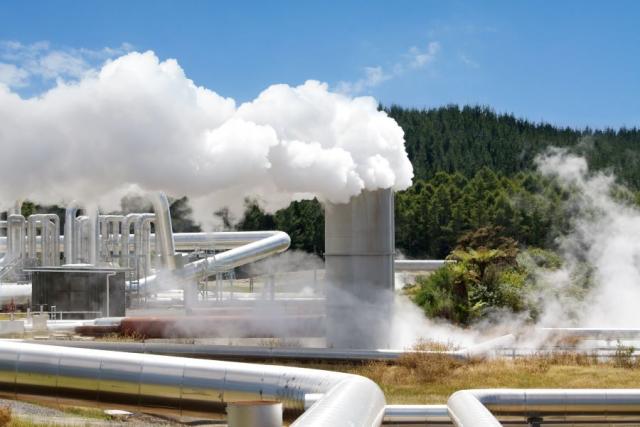
The U.S. Department of Energy's Geothermal Shot will target over 5 terawatts of heat resources in the U.S. to power communities. (Source: N. Minton / Shutterstock.com)
The U.S. Department of Energy (DOE) is seeking to lower the cost of enhanced geothermal systems (EGS) by 90% to $45 per megawatt hour by 2035 with its latest Energy Earthshot initiative.
The Geothermal Shot, announced Sept. 8, is targeting the more than 5 terawatts of heat resources in the U.S. to power communities. Capturing “even a small fraction” could power more than 40 million American homes, the DOE said in a statement.
The move is part of the Biden administration’s goals of 100% carbon pollution-free electricity by 2035 and net-zero emissions by 2050.
“The United States has a vast, geothermal energy resource lying right beneath our feet, and this program will make it economical to bring that power to American households and businesses,” U.S. Secretary of Energy Jennifer M. Granholm said in a statement.
“DOE’s Enhanced Geothermal Shot will move geothermal technology from research and development to cost-effective commercial adoption, helping energy communities and workers transition to producing clean energy for the future.”
EGS feature wells drilled at least 4,000 ft underground, extracting heat byway of fracture systems to which water is added through injection wells. Injected water is heated when it contacts the hot rock, returning to the surface via production wells. The heat extracted can be used to heat or cool homes and buildings, or to generate electricity.
However, conditions in these EGS reservoirs— where temperatures can reach 380 C or higher at deeper depths—can be harsh.
Besides the hot temperatures, rocks are hot and abrasive and the environment corrosive, the energy department explained. In some instances, there is insufficient fluid to carry the heat and limited pathways to conduct fluid. The Geothermal Shot plans to address the challenges by accelerating R&D and demonstrations to improve subsurface knowledge. It also seeks to improve well engineering designs.
The energy department’s latest geothermal investments include up to $165 million to transfer best practices from oil and gas to advance geothermal, $84 million to support four pilot EGS demonstration projects and $44 million to spur EGS innovations for DOE’s Frontier Observatory for Geothermal Energy Research field lab.
“Geothermal energy currently generates about 3.7 gigawatts of electricity in the United States, but a substantial amount of geothermal energy is not accessible with current technology,” the energy department said. “Research and innovation to advance EGS drilling, and engineering can unlock those resources and put new, clean electricity on the grid.”
The Geothermal Technologies Office’s multiyear program plan aims to deploy 60 GW of enhanced geothermal systems and hydrothermal resources, as well as the installation of 17,500 geothermal district heating installations and 28 million geothermal heat pumps nationwide by 2050.
Recommended Reading
Bechtel Awarded $4.3B Contract for NextDecade’s Rio Grande Train 4
2024-08-06 - NextDecade’s Rio Grande LNG Train 4 agreed to pay Bechtel approximately $4.3 billion for the work under an engineering, procurement and construction contract.
Cheniere’s Corpus LNG Stage 3 Project on Track for Year-end Start
2024-08-09 - Cheniere Energy., which boasts 45 mtpa of LNG production capacity, is on schedule for first LNG production from its Corpus Christi LNG Stage 3 project by year-end 2024, the company’s CEO Jack Fusco said during a quarterly earnings webcast.
Dividends Declared in the Week of Aug. 19
2024-08-23 - As second-quarter earnings wrap up, here is a selection of dividends declared in the energy industry.
Gulfport Energy to Offer $500MM Senior Notes Due 2029
2024-09-03 - Gulfport Energy Corp. also commenced a tender offer to purchase for cash its 8.0% senior notes due 2026.
Pembina Completes Partial Redemption of Series 19 Notes
2024-07-08 - The redemption is part of Pembina Pipeline’s $300 million (US$220.04 million) aggregate principal amount of senior unsecured medium-term series 19 notes due in 2026.
Comments
Add new comment
This conversation is moderated according to Hart Energy community rules. Please read the rules before joining the discussion. If you’re experiencing any technical problems, please contact our customer care team.






